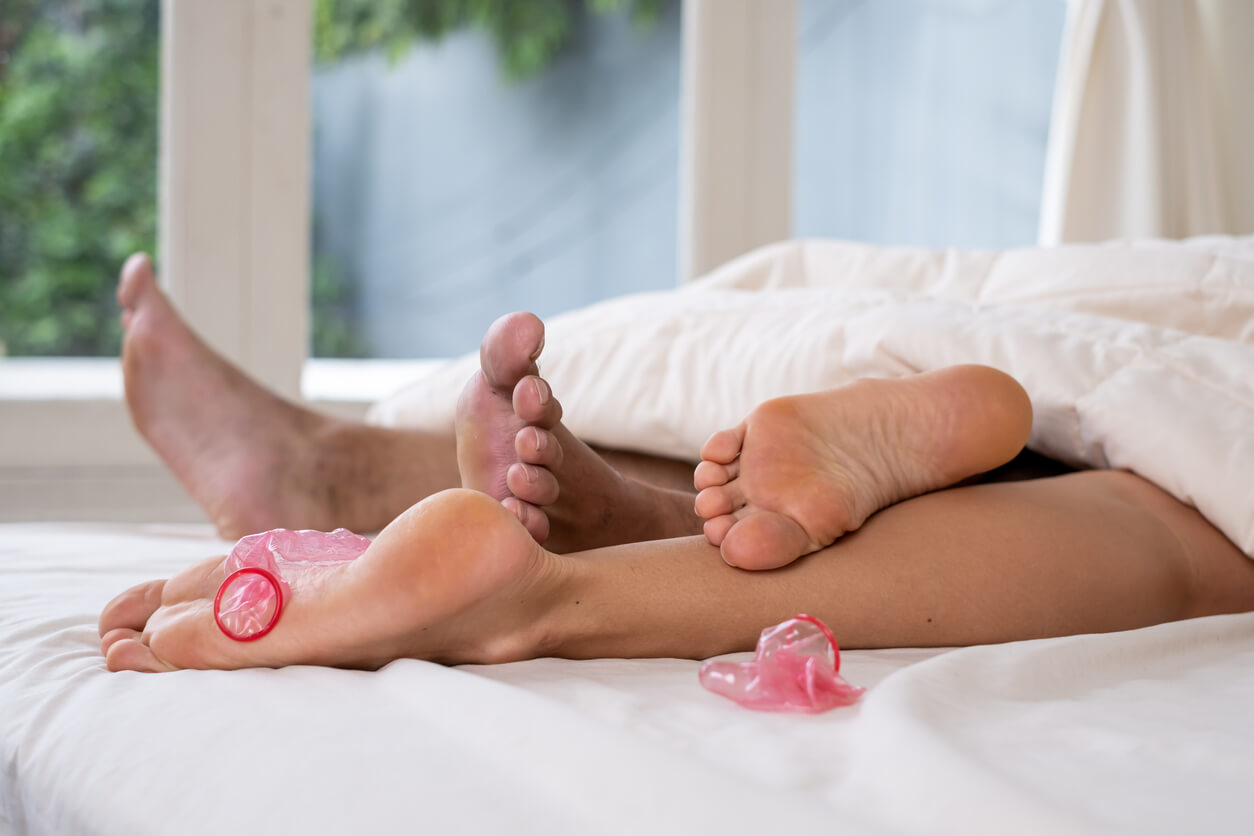10 Ways to Increase Female Libido
Low libido (also referred to as low sex drive) is a term used to describe a decrease in your sexual appetite. While low libido can impact everyone, women* tend to feel like their sex drive has taken a dip more often than men: an estimated 1 in 3 women will experience what they regard as a drop in their libido at some point in their lives, compared to 1 in 5 men.
Despite how common it is for these fluctuations to occur, the concept of libido being high or low isn’t exactly a precise measure - there’s no baseline metric for how sexually aroused you should be feeling. In reality, sexual desire is experienced on a different spectrum for everyone. Libido can also be affected by countless factors, such as age, lifestyle, hormonal changes, stress, relationship issues, medications and more.
Whether you're looking to reignite a spark in your relationship, seeking ways to feel more connected with your own body, or educating yourself on the connection between libido and mental and physical health, Sesame’s here to talk about sex! In this blog, we’ll address common ideologies and misconceptions about women's libido along with medically-backed tips to support your sexual well-being.
Is it possible to increase female libido instantly?
Not exactly. A common - but inaccurate - myth is that women should be able to simply snap their fingers and feel aroused. In reality, though, the speed and intensity of sexual desire is nuanced and different for everyone. According to researcher and author Emily Nagoski, there are actually many kinds of sexual desire:
- Spontaneous sexual desire: Like its namesake, this type of desire shows up immediately regardless of stimulation. In other words, you go from not being in the mood, to being in the mood. Interestingly, only about 15% of women experience spontaneous desire.
- Responsive sexual desire: This type of desire occurs in response to an external environmental factor, like physical touch or reading a steamy book. Around 30% of women experience this type of desire.
- Contextual sexual desire: With contextual desire, your libido is affected by different circumstances. For example, if you’re stressed with a new work project or anxious about a life event (parenting, divorce, loss), your libido may not feel as heightened. However, the context of a romantic date night or an evening away from your kids may reignite the flame. About 50% of women experience contextual desire.
In other words, some women may be able to feel immediate desire at the drop of a hat. For others, however, it’s more likely that factors like environment, mental health or physical health may need to be addressed in order to heighten libido. Because of this, it’s important to navigate sexual health and desire with confidence and curiosity - and without judgment.
10 Ways to Increase Female Libido
For some, sexual desire ignites quickly and seemingly out of nowhere and can be triggered by a thought, a sight, or even a sudden impulse. For others, sexual desire unfolds more gradually, requiring sustained stimulation and a buildup of emotional or physical intimacy over time. We’ve listed out both shorter-term and longer-term methods for boosting libido below.
The following tips may be effective for those who want to boost libido quickly.
1: Don't forget the lube
Many women - especially those who are menopausal or postmenopausal - experience vaginal dryness. It can be a result of stress, hormonal changes, medications, aging, menstrual cycles and more. It can also be uncomfortable or even painful, which can make it difficult to get in the mood for intimacy.
Luckily, studies show that personal lubricants can make your sex life far more enjoyable. Lube can reduce friction caused by vaginal dryness, make sex more comfortable and pleasurable. One study from the Center of Sexual Health Promotion found that 70% of women who used lubricant reported that it improved their sexual experience.
There are three main types of lubricants: water-based, silicone-based and oil-based. Be aware that oil-based lubricants can break down condom latex (talk about killing the mood), and can also stain fabrics. Silicone-based lubricants can break down silicone toys, and water-based lubricants can dry out more quickly. For that reason, it’s best to research which type of lubricant is best for your bedroom preferences beforehand.
Note: Even though vaginal dryness is both common and treatable, over 50% of women with vaginal dryness don’t tell their provider, in part due to societal stigmas. If vaginal dryness is impacting your sex life, consider having a call with your healthcare provider to talk through concerns and potential solutions!
2: Spice up your intimacy routine
Changing things up in the bedroom is a great way to reignite passion with your partner. If you’re feeling uninspired by your sex life, try communicating - without blame - that you’d like to switch up your routine. Consider exploring new positions, changing locations, or setting aside time to focus solely on each other to keep the excitement alive and strengthen libido. A sex therapist can also help you and your partner to develop new strategies or discuss issues in a more productive way.
This practice is especially important if you feel like you and your partner are experiencing desire discrepancy (when one partner is more interested in sex than the other). Studies show that people who take steps to combat desire discrepancy - like communicating openly and experimenting with new positions or toys - have higher levels of sexual satisfaction. On the other hand, people who did nothing to combat desire discrepancy had lower levels of relationship and sexual satisfaction.
3: Don't skip foreplay
Foreplay - a term used to describe any sexual activity that occurs before intercourse - can be a huge catalyst for sexual desire. It’s also especially important for women: only about 18% of people with a vagina are able to orgasm just from penetrative sex, and over 1/3 of people with a vagina need clitoral stimulation to climax.
Countless studies highlight the psychological and physiological benefits of foreplay. For example, one 2012 study found that both men and women are less likely to experience difficulties with orgasm, sexual pleasure, and sexual arousal when they engage in foreplay such as kissing, hugging, caressing and other forms of sexual touch.
Foreplay also stimulates the release of hormones like oxytocin and dopamine, which not only heightens desire but can also strengthen emotional intimacy between partners.
4: Limit your alcohol intake
While a glass of wine may help you feel more at ease or help you get in the mood, it’s important to be mindful about how much - and why - you’re drinking. Research shows that women often associate drinking alcohol with enhanced arousal. In reality, however, alcohol can actually put a damper on sexual function and libido.
In fact, a 2023 study found that women who consumed alcohol were 74% more likely to experience sexual dysfunction (such as difficulties with arousal, ability to orgasm and reduced vaginal lubrication) compared to those who did not consume alcohol.
In other words, it might be helpful to skip the drinks and find a different way to set the mood for yourself. Drawing a bath, dimming the lights, lighting a candle or putting on something that makes you feel good about yourself are all great ways to put yourself in a more confident and relaxed headspace.
Of course, an “instant” libido boost may not have the same effect for everyone. However, there are other lifestyle changes that may strengthen libido over time. Some longer-term tips for improving libido include the following:
5: Improve your diet and nutrition
Research is pretty limited when it comes to specific “aphrodisiac” foods and herbal supplements that can improve libido in women, so it’s important to think about the idea of libido booster foods with a grain of salt. We’re looking at you, oysters.
What research has consistently shown, however, is that plant-forward diets, such as the Mediterranean diet, are ideal for overall health and wellness. These balanced diets help improve hormone balance, blood pressure, blood flow and energy - all of which impact your sex drive.
This means incorporating lots of berries and vegetables, whole grains, fish and non-animal sources of protein and iron (think beans and nuts) into your diet. It means limiting high-fat, high-sugar, and highly processed foods such as soda, candy and chips.
6: Explore ways to manage anxiety and stress
High anxiety and stress levels can dampen your sex drive, largely because stress causes the release of a hormone called cortisol that can interfere with sex hormones. Cortisol activates a system in your body that prepares it for fight or flight responses - in other words, it can put you on edge and make it more difficult to get in the head space for intimacy.
This was reflected in a 2013 study conducted on women who were experiencing chronic stress; women in the high-stress group had higher levels of cortisol and lower levels of genital sexual arousal.
If you’re exploring healthy ways to lower cortisol levels and improve your mental health, consider incorporating stress-reduction practices like mindfulness, meditation, or yoga into your routine - a calm mind may be more receptive to sexual arousal and desire.
7: Make sure you’re getting enough sleep
Making sure you’re well-rested may seem like an obvious solution for improving your sexual appetite - falling asleep mid-makeout isn’t exactly a mood-setter, after all.
But there’s more than meets the eye (or shut-eye, if you will). Quality sleep is actually critical for maintaining hormone balance, which in turn affects libido. A study of 171 women in the United States found that getting an extra hour of sleep led women to feel more easily aroused and resulted in a 14% increase in the odds of sex the next day.
So if you’re exploring ways to heighten your libido, getting even just an additional 60 minutes of z’s may be enough to make a difference. Consider establishing a soothing bedtime routine to improve your sleep quality and support your sexual health.
8: Divvy up household tasks equally
While it comes as no surprise that most women don’t enjoy reminding their partner to unload the dishwasher, research suggests that unequal participation when it comes to household chores can have a big impact on libido.
A recent Journal of Sex Research study found that women who were in more equitable relationships (i.e., relationships where household responsibilities and mental loads were shared) tended to have higher levels of sexual desire. Put simply, sharing chores fostered intimacy and sexual interest.
If you’re feeling like you’re taking on a heavier burden when it comes to parenting, cooking or cleaning, consider having a discussion with your partner - a shift in your workload could mean a shift in your libido, too.
9: Make physical activity part of your daily routine
Regular physical activity can improve libido for a number of reasons. Exercise can boost energy levels, improve body image and self-esteem, and enhance blood circulation, all of which can increase sexual desire.
There are a number of studies that support this positive relationship between physical fitness and sexual health; in fact, studies of women with antidepressant-induced sexual dysfunction and women who had undergone hysterectomies found that exercise was able to improve sexual arousal for both groups.
It’s especially important to stay physically active as you get older. A 2017 study published by the Journal of Sex Research found that when 1,000 adults aged 40 and older responded to two surveys about their sex lives 10 years apart, the frequency, quality, and interest in sex all declined over that ten-year period – and those who were in better health tended to have more active, satisfying sex lives.
Even if you’re just stepping out for a 15-minute walk, incorporating some level of physical activity into your daily routine is great for overall physical and mental health.
10: Talk to a healthcare provider
Sexual health is just as important as any other type of health, and it should get just as much attention from you, your partner and your doctor.
If self-help strategies or lifestyle adjustments like the ones listed above aren’t helping, talk to your healthcare provider so that they can assess if your libido fluctuation is a result of a health condition. Medical causes of low libido can include the following:
- Hypoactive sexual desire disorder (HSDD): HSDD is a medical condition where a person has very little interest in sexual activity or does not want to have sex at all. This lack of interest typically causes distress or relationship problems. It's not just about being in the mood less often; it's a consistent disinterest that affects a person’s life and happiness.
- Menopause: Premenopausal women, menopausal women and postmenopausal women all undergo significant hormonal changes as their menstrual cycles slow and eventually stop. The body’s estrogen production plummets during this time, which can lower sexual desire, cause vaginal dryness and more.
- Antidepressant medication: Decreased libido is one of the most common side effects of antidepressants; Fluoxetine (Prozac), paroxetine (Paxil), fluvoxamine (Luvox), citalopram (Celexa) and sertraline (Zoloft) have all been reported to cause low sex drive. If this is the case for you, your provider may consider switching you to a different antidepressant medication, such as Bupropion (Wellbutrin), instead.
Once your provider has assessed if any of these factors are contributing to a decreased libido, they can provide advice and discuss other treatment options or techniques to try. Depending on the cause, your provider may prescribe hormone therapy to balance hormone levels. They may also prescribe medication such as Flibanserin (Addyi) and Bremelanotide (Vyleesi), which are sometimes prescribed to improve women’s sexual desire.
How Sesame can help
Improving your sex drive can involve a combination of lifestyle changes, dietary adjustments and possibly medical interventions. If you have concerns about your libido, Sesame offers convenient and discreet online doctor visits to address concerns over libido, menopause and other issues.
These quick, affordable video appointments allow you to discuss your symptoms and potential treatment options with a licensed healthcare provider from the comfort of your own home. If appropriate, providers on Sesame can prescribe medication and other forms of therapy to help you get your sex life back on track.
*A note about sex and gender: Gender and sexuality are part of a broad spectrum. Please note that in the case of this article, the terms “men” or “male” and “women” or “female” are referring to sex assigned at birth.









